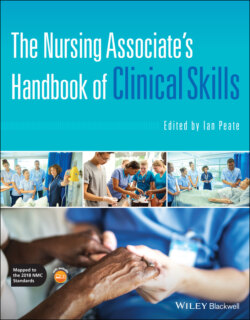Читать книгу The Nursing Associate's Handbook of Clinical Skills - Группа авторов - Страница 218
Take Note
ОглавлениеFurther information on safe storage of manually generated records should be read locally as care providers will have requirements that each nursing associate must be aware of.
Finally, in Section 10, nursing associates are reminded to collect, treat and store all data and research findings appropriately. While many nursing associates may not consider themselves to be part of a research team, much of the data that is recorded during day‐to‐day work could be used as valuable data in a research project. When considering data being used as part of a research project, the project will have been granted ethical approval from the organisation overseeing the study. This ethical clearance will include clarification of how data will be gathered, collected, stored, analysed and reported. Whether acting in the capacity of a data collector or indeed the researcher, it is imperative that the nursing associate follows the guidelines set in the research proposal that has been analysed by the relevant ethical body. What is very important to consider in this section is that often data is accessed retrospectively. If a research study, for example, was being conducted into whether turn charts were effective in the prevention of pressure ulcers, the researcher may look at records relating to previous admissions where patient outcomes are already known. This puts an onus on nursing associates to ensure that all records are clear and accurate as all records could potentially form part of a research study. This final requirement has so many close relations with the other requirements of section 10 of The Code (2018a) that it clearly demonstrates how important record‐keeping is professionally.
Having considered record‐keeping from a professional perspective and addressed all the aspects described in The Code (2018a), it is clear to see that record‐keeping should be fundamentally straightforward; however, there are many strands to record‐keeping that are so intertwined that it is difficult to do one without the other. For example, to keep a clear record, it has to be legible, dated, timed and so on. In the next part of this chapter, the legal perspective will be addressed in an attempt to demonstrate that the reason nursing associates have to keep clear and accurate is that a number of different Acts and pieces of legislation may require records to be scrutinized.
